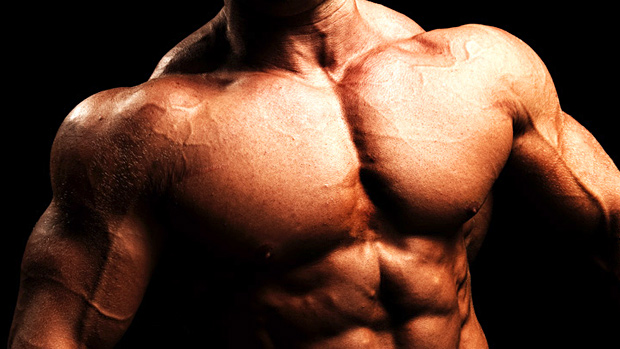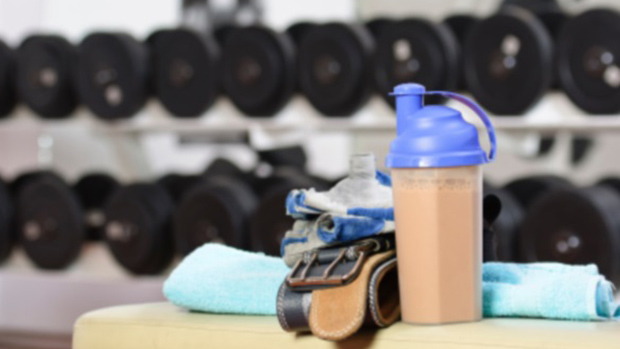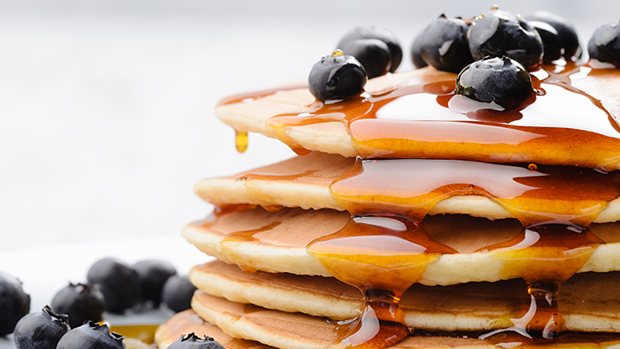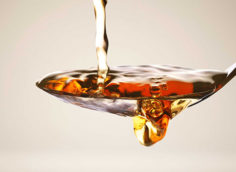Diet Without the Drawbacks
Fat-loss diets are mostly a pain in the butt, especially if you lift weights for the primary or at least secondary goal of looking badass.
The diets are generally too severe, too muscle limiting, too muscle wasting, too make-you-crazy and want to hit the world in the head with a waffle iron. They won't get you to badass.
But this one isn't a pain in the butt and it will get you where you want to go, physique-wise.
While the origins of the diet I'm proposing are based in hard science and legitimate research studies, it was popularized in the Cosmo, Glamour, and People magazine fat-loss world. I merely absconded with it and adapted it to the needs of lifters, bodybuilders, and athletes.
The fat-loss plan I modified is known either as "The Fast Diet" or the 5/2 Diet and two entrepreneurial types named Dr. Michael Mosley and Mimi Spencer wrote a book about it.
The diet is based on intermittent fasting, which is exactly what it sounds like - you go without food, but not continuously for agonizing durations. Instead, you go without food intermittently for shorter, doable (but still amazingly effective) durations.
Eat what you normally eat 5 days a week. But on 2 non-consecutive days, eat just two meals, twelve hours apart, for a total of 800 calories each day. Make those low-cal days non-workout days.
That's it. This way of eating will allow you to lose about a pound of fat a week while still allowing you to gain muscle and strength. I believe it will also prime you for unprecedented muscle gain, as it'll reset your insulin sensitivity.
Oh yeah, it'll probably also improve your blood chemistry dramatically, protect your heart, stave off cancer, and make you live longer, should you care about stuff like that.
Fasting in general is the oldest of all dieting plans, probably coming into existence when Anthony told Cleopatra she looked fat in her bag-tunic. It made sense, at least on the surface: drastically reduce calories and your body burns up the fat just to stay alive.
But fasting was/is problematic for a whole host of reasons. It's psychologically brutal and can't be sustained. It makes you feel crappy, gives you bad breath, makes your mere presence objectionable to all decent souls, and, most significantly to lifters and athletes in general, preferentially eats up muscle mass.
However, fasting does have benefits. You'll certainly lose some body fat. You may even feel mentally sharper, up to a certain point. And most importantly, it improves insulin sensitivity.
When you eat all the time, or nearly all the time, insulin levels are always elevated and consequently your body is always in fat-storing mode. Since your blood remains a sugary substance more chemically related to Mountain Dew than healthy blood, your pancreas is forced to pump out ever increasing amounts of insulin.
Fat accrues accordingly, but an even more sinister event occurs - the cells stop responding to insulin and you clinically become Type II diabetic. More fatness ensues. Pants require letting out.
It's my assertion that many lifters are on the edge of the Type II diabetic cliff.
They're always eating to ensure a steady nutrient influx because they've been told to eat that way (for muscle gain) by fat boys everywhere, so their insulin levels are always high and their insulin sensitivity eventually gets very low.
It's a bad recipe that leads to poor body composition and poor overall health.
Luckily, after only a few hours of fasting, insulin sensitivity starts to improve and the body switches from fat-storing mode to fat-burning mode, hence the effectiveness of Intermittent Fasting (IF) as a fat-loss/health strategy.

There are gigabytes of data on lab animals and IF. One in particular undertaken at the Salk Institute involved two groups of mice on isocaloric diets.
Both groups ate the same (high fat) diet and the same amount of calories, but one group was allowed to eat whenever they wanted while the other group had to consume their entire food allotment in 8 hours.
The latter group, in effect, spent 16 hours a day fasting.
After 100 days, the IF mice put on 28% less weight and exhibited lower cholesterol levels, lower blood sugar, less liver damage, and lower levels of chronic inflammation. Clearly, in this experiment, IF made a great case for itself.
Dr. Michelle Harvie, along with her colleagues, conducted another study on IF, this one consisting of 107 female human types.
The women in the study were randomly assigned to one of two groups, the first comprised of women who would restrict their daily calories by 25% seven days a week, and the second comprised of women who would also restrict their calories by 25%, but only on two days each week.
After 6 months, both groups had lost equal amounts of fat, along with comparable reductions in leptin, C-reactive protein, total and LDL cholesterol, triglycerides, and blood pressure. Most surprisingly, though, the IF group experienced a greater reduction in insulin resistance than the group that dieted 7 days a week. That's huge.
The data indicates that IF is a smart way to lose body fat with huge implications for body composition and blood chemistry, but is it a smart approach for weightlifters? I say it is.
In the world of body comp, insulin sensitivity is everything. The more sensitive your cells are to insulin, the greater your results in both building muscle and being lean enough for anyone to see that muscle. In fact, manipulating and taking advantage of insulin is at the heart of Biotest's workout nutrition strategies.
Therefore, IF, specifically the 5/2 version, should allow a lifter to steadily get more ripped with each passing week without losing muscle mass.
It could also theoretically allow a bodybuilder to undergo a bulking phase while still losing body fat, simply because of enhanced insulin sensitivity that makes them put on muscle more easily while also losing fat.
I also maintain that doing a relatively short-duration stint on 5/2 for Lifters could prime your body for a subsequent mass-building phase.
So if you did two months of 5/2 for Lifters prior to going on a mass phase, you would prime your body to put on muscle mass more quickly, again thanks to increased insulin sensitivity.
Five days a week, eat normally. On two non-consecutive days of the week, eat two meals of approximately 400 calories, 12 hours apart. These two days should be non-weightlifting days or cardio days so as not to interfere with post-workout healing and hypertrophy.
On your two fasting days, drink two scoops of a fast-acting protein formulation, Mag-10® being ideal, either as part of each 400-calorie meal, or 30 minutes prior to each meal, to ensure that there's absolutely no possibility of muscle loss during the fasting periods.

Have you followed this fat-loss diet?
Yes, and so have a few of my friends. It works as advertised.
Won't I be missing out on nutrients if I limit myself to 800 calories two days a week?
Stop thinking of nutrition in terms of 24-hour periods. It's almost impossible to ingest all your necessary vitamins, minerals, phytochemicals, and assorted micronutrients on a non-fasting day, let alone a fasting day.
Think in terms of weeks, not days. Do you think you ate well enough this past week to meet all your nutritional needs? That's the pathway to health.
Furthermore, the body stores most nutrients in case you don't ingest them every day. Consider the much ballyhooed vitamin B12, a favorite son of hucksters everywhere. While it's considered essential to health, the vast majority of people have a big enough supply stored in their liver to last five years.
Add to that the eye-opening fact that over the course of your lifetime, you only need about 40 milligrams of B12, which is a speck of powder half the size of a single baby aspirin.
So no, you won't be missing out on vital nutrients.
Will I have hunger pangs on fasting days?
Maybe, but suck it up.
Will I have trouble sleeping on fasting days?
See answer to question 3. That, or take a non-addictive sleep aid such as ZMA®.
Is the diet hard to do?
It's easy for most people. Unlike most eating plans, it won't interfere with your social life too much. You might also like the hungrier, sharper animal you become on fasting days, because complacent animals don't get much done.
Can I still build muscle on this plan?
Absolutely. The 5/2 Plan for Lifters improves insulin sensitivity, and in the world of growing muscle (and growing leaner), insulin rules.
Won't the fasting days interfere with muscle growth and repair?
It's unlikely, especially if you protein pulse during the diet. The most crucial times for growth and repair are the few hours immediately after a work out. That's why workout nutrition is so important.
However, that's why you shouldn't fast on training days - only fast on non-training days or cardio/GPP days.
Won't I just overcompensate and overeat on non-fasting days?
It's possible that you could eat more the day after a fast, but it doesn't seem to be an issue, either in the laypeople who follow the original Fast Diet or any of the small group of lifters I've had following my version of the diet. Amazingly, it still works out.
What kinds of meals should I eat on my fasting days?

You can have normal muscle-building meals, only a lot smaller. For instance, a 4-ounce steak and a cup of chopped broccoli are about 300 calories.
Protein pulse with 2 scoops of Mag-10® and you're close to 400 calories, which is half of your fast-day allotment. Granted that's not a lot of food, but drinking coffee liberally seems to help with any hunger pangs.
Are there any supplements that would help with the 5/2 Fat-Loss Diet for Lifters?
Absolutely. Follow a workout nutrition plan (Plazma™ or Surge®), protein pulse as prescribed, and use Indigo-3G® to further improve insulin sensitivity and help fat cells purge fat.
How much fat can I expect to lose?
You should expect to lose about a pound of fat a week, in addition to perhaps building muscle faster because of increased insulin sensitivity.
Will this plan work for women, too?
Damn straight, only they should aim to eat 600 calories per day instead of 800 on their two non-consecutive fasting days.
I should note that the original diet, as envisioned by Mosley and Spencer, recommended that men take in 600 calories per fasting day instead of the 800 I prescribe, along with women taking in 500 instead of the 600 I recommend.
I manipulated the numbers because athletes and lifters are different animals than those that make up the general public in that their caloric baseline is higher.
How long should I follow the 5/2 Fat-Loss Diet for Lifters?
You can do it for as long as you want and you shouldn't experience any diminishing returns. Granted, you might eventually run out of blubber to burn, but you should stay lean while enjoying the muscle-building effects of greatly increased insulin sensitivity.





